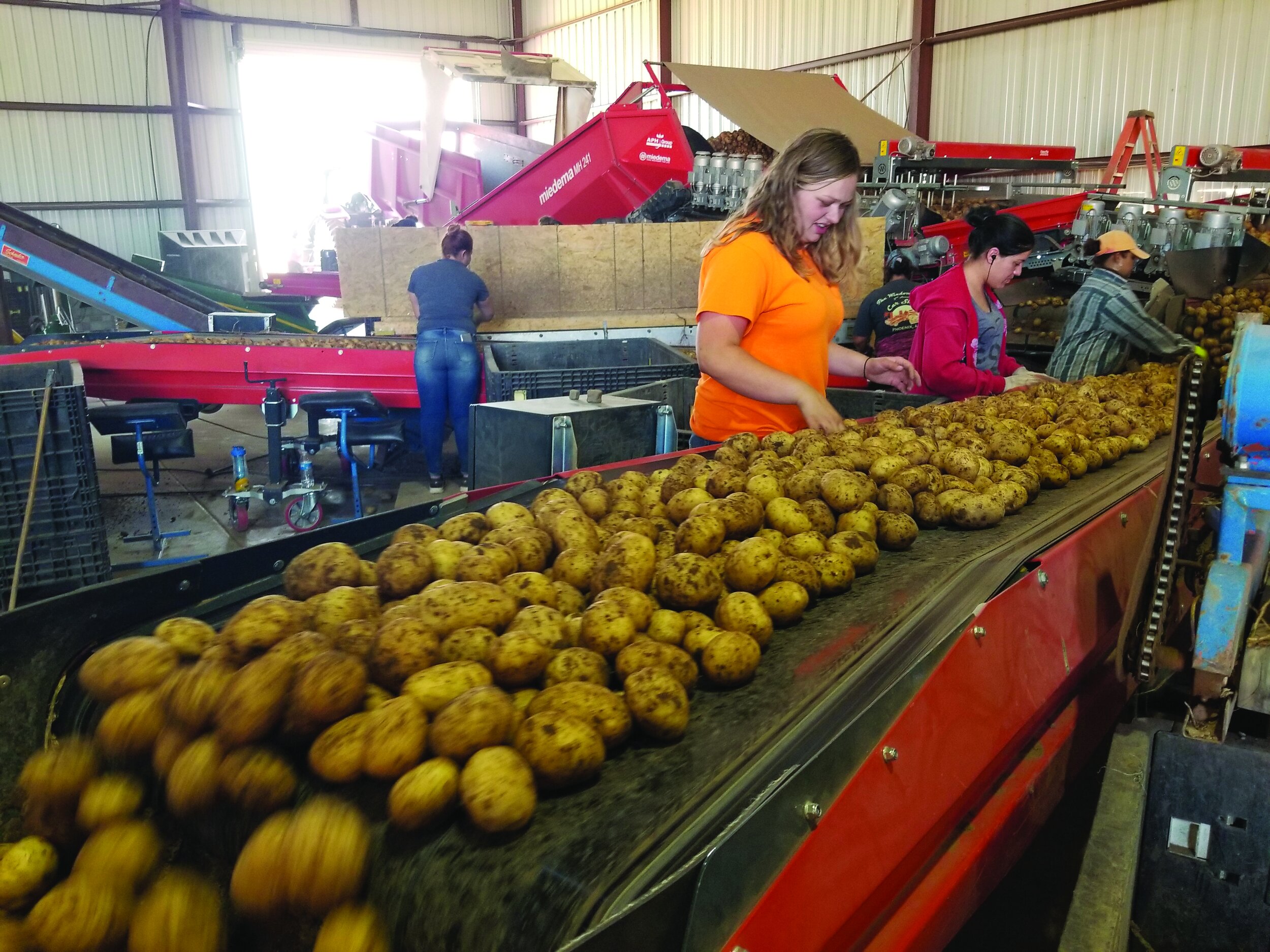There’s a New Crop in Town
When driving through the Sulphur Springs Valley in the summertime, you will see fields of alfalfa, cotton, corn, beans, and more recently, potatoes. The inconspicuous plant has the same green hue of a cotton plant, but real gold is what lies just inches under the soil. Joost and Ingeborg Gijzenberg bring a lifetime of growing experience from the Netherlands, where Joost grew up growing potatoes from a very young age under the MTS Gijzenberg family business name. While Ingeborg didn’t grow up in an agriculture family (her dad was in IT and her mom was a teacher), she is a vital component to the growing operation that’s nestled in the heart of the Sulphur Springs Valley.
The original farmland was purchased by the Gijzenberg’s in 2009 while they were still in Holland, and managed by a local farmer who continued to raise crops traditional to the area. The Gijzenberg family, including their three daughters, Emma, Noah and Isis, immigrated in 2015, took over management of the farm and started farming corn, rye and alfalfa. Joost gained experience with the soil, climate and elevation and planted 30 acres of potatoes in the spring of 2017 as a trial. By this time, the word of his presence was known by players in the U.S. potato market, and he struck a deal with Sunrain-Potandon out of Idaho. The contract was for both fresh and seed potatoes, which would be hauled to Eloy after harvest for washing, storage and distribution. The Gijzenbergs were able to capitalize on the climate, location, good soils and great water of the Sulphur Springs Valley to provide a superior seed product that fit into the timing of farmers across the country, mainly in the southeast, where soil temperatures warm up before ours. In 2018, the acres planted to potatoes grew to a full pivot of 120 acres. In 2019, even more growth occurred with 375 planted acres. At this time a Minnesota based company, Plant, Grow, Harvest (PGH) partnered with Joost and they rented land to him to grow potatoes while they handled the washing and cold storage portion of the process in their new facility in Sunsites.
This year marks a record 720 planted acres planted to potatoes for Joost, which include over 23 varieties. The varieties are categorized by size and flesh color, which vary from creamers, yellows, reds, bigs and also processed varieties for French fries and chipping. While the growing season is rather short compared to traditional crops, monetary input is very high. Potatoes require minimal water (around 2.5 acre-feet) and are planted the first week of March. After planting, the potato is susceptible to frost as a young plant. The monsoon season poses an additional threat of potential damage to the green portion of the plant from hail, heavy rain or saturated soil. During the growing season, the fields are routinely inspected by an independent company, Arizona Crop Improvement, who collects samples to send to labs in North Dakota to test for bacteria and other water or soil-borne contaminants.
Around the first week of June, a large green digger machine moves slowly through the fields, penetrating the soil to six inches, carefully scooping the soil, potatoes and plant material up onto a conveyor system. The potatoes are then transferred to a buggy and taken to a shed for sorting. The machine system is a specialized mix of equipment the Gijzenbergs brought over from Europe this winter in order to efficiently handle their increased productivity in 2020. The machine shakes and sorts the potatoes by size. Hand labor is used to remove plant and rock debris, then the potatoes fall into a bin. Once full, a forklift strategically moves the full bin to a scale and a ticket is placed on it with the variety and size specifications. Their advanced computerized system keeps track of the records so precisely, that a single variety of potato can be traced back to the exact field and lot number on the farm. This ensures the highest food safety measurements are in place. Seed potatoes are then stored in cold storage around 50 degrees F. The fresh potato varieties are immediately hauled 32 miles to the wash plant in Sunsites to be cleaned and distributed to the companies that then package and deliver them to the consumer. Any culled potatoes are donated to a local food bank system.
While Joost finds the greatest joy in the hands-on, day-to-day field operations, he also has to manage and oversee all aspects of the process in perfect unison as the family’s acres in potato production continue to grow. On the home-front, the Gijzenberg’s roots are strong. Oldest daughter, Emma (22), is currently in Holland where she’s getting an International Teaching degree. Middle daughter, Isis (20), has fallen in love with this western state and is a clone of her dad as she enjoys the daily farm activities and a passion equal to his for agriculture. Youngest daughter, Noah (19) is back in Holland and attending medical school. Her boyfriend Tim’s family has one of the biggest potato wash-plants in the country. Looks like this new crop is here to stay.
ABOUT THE AUTHOR: Contributor Patina Thompson earned a bachelor’s degree in Wildlife, Watershed and Rangeland Resources from the University of Arizona, Tucson, Ariz. She works in the agriculture insurance field. She is a wife, mother, rancher, hunter, photographer and conservationist in Southeastern Arizona.


